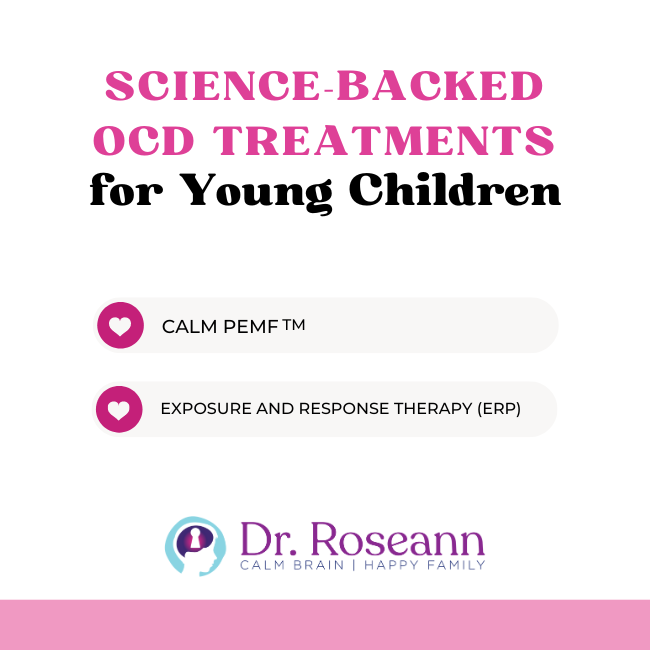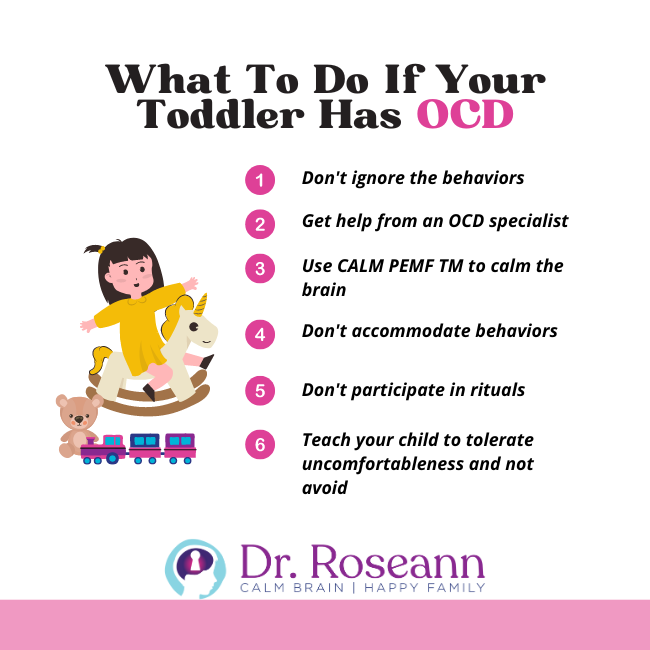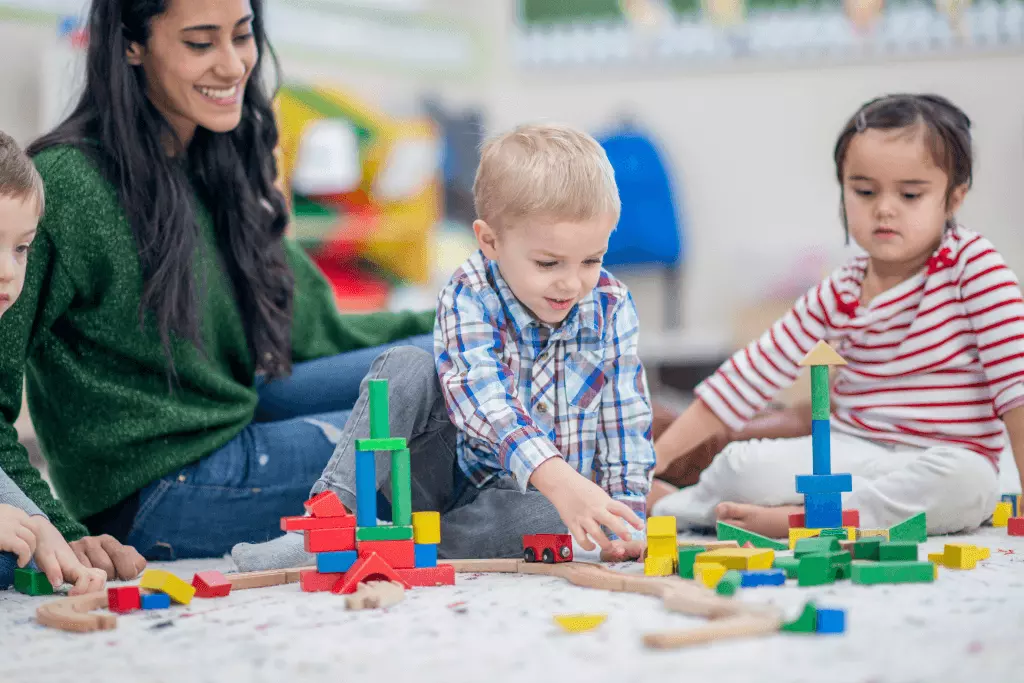We often think of OCD as a disorder that only affects adults, but even young children can have Obsessive-Compulsive Disorder (OCD). Despite their best efforts, children with OCD cannot stop their disturbing thoughts, images, and urges, no matter how hard they try.
Toddlers may show more subtle signs of compulsive thinking or behavior, which often can be very normal However, obsessive and compulsive behaviors can still be observed. Their lack of communication skills and OCD behaviors can go undetected in young children. A child, for example, may display rigid bedtime rituals, like fixing their pillows repeatedly or requiring the parent to read the same book every night.
Most children develop OCD-related behaviors gradually, but some may show sudden onsets. When OCD suddenly develops, PANS/PANDAS should be considered. This condition can appear due to a misdirected immune response caused by environmental factors, infection, or other possible triggers. PANS/PANDAS leads to sudden psychiatric symptoms, including OCD, tics, rage, restricted eating, separation anxiety, etc.
A child with OCD may be overly preoccupied with dirt, germs, illness, order, exactness, and symmetry. A young child may become very upset when you transition them from one activity to another. Excessive hand washing, grouping objects, and repeated checking, sequencing, or counting are typical examples of compulsive behaviors. Repeating words spoken is another.
In addition, they may think about something terrible happening or have aggressive thoughts. While transitioning is typically an issue for most young children because this is a learned skill, a parent should be concerned when it is a continual issue, and the child has major meltdowns.
To diagnose OCD, a mental health professional conducts a clinical interview. At the intake, the clinician assesses if there are obsessive-compulsive behaviors present and how they impact the child's life. Unfortunately, psychological or laboratory tests for OCD do not exist, which frustrates parents. However, a QEEG brain map and PEMF are proven to help.
Can a Child Outgrow OCD?
OCD is not something you outgrow as a child. But through the right therapy and treatment, children can overcome it, especially when you address it when they are young. However, their symptoms can worsen during stress, hormonal transitions, or developmental changes. Symptoms can worsen with the wrong treatment, including anxiety psychotherapy or psychiatric medication.
It is also common for symptoms to wax and wane, which can confuse parents. However, a child's obsessions and compulsions can be successfully managed with early support. Furthermore, the child with OCD should also be diagnosed with other mental health conditions such as ADHD, autism, and anxiety disorder.
How Does OCD Impact Preschool?
Various obsessions and compulsions can impact learning and processing. For example, children with OCD are typically slow to process information and exhibit perfectionistic tendencies. Their mental rituals can also cause them to have focusing difficulties.
OCD may increase emotionality or rigidity in children. Most signs and symptoms are more subtle and are misinterpreted as a processing, focus, or behavioral issue.
I recall observing a five-year-old with rituals at his preschool and no one saw his behaviors as OCD. Instead, they saw his rigidity as noncompliance. With the right diagnosis, PEMF and parent ERP coaching, Brendon was able to overcome his OCD pretty quickly. Breaking OCD behavioral habituation is simply easier when the habit isn’t as ingrained and when the brain is calm.
A child who suddenly develops OCD due to PANS/PANDAS can experience such a sudden change in the intensity of their behavior. Therefore, these children must receive immediate medical attention from a PANS/PANDAS specialist.
Science-Backed OCD Treatments for Toddlers

The treatment of OCD involves a combination of traditional and holistic approaches. While medication benefits some adults, children don't. Effective treatments for OCD include Cognitive Behavioral Therapy (CBT) and Exposure and Response Therapy (ERP).
Parents must participate in ERP therapy sessions and their processes to support their children with OCD. A child's obsessions and compulsions should not be suppressed or reinforced but instead tolerated in line with the exposure therapy process.
The therapy aims to reduce, if not eliminate, obsessions and compulsions. As the first step, get your child's help from an ERP therapist. Getting the Central Nervous System regulated is the first step in clinical therapy.
Cognitive Behavioral Therapy
CBT aims to change how the mind works on the conscious level. For example, in cognitive behavioral therapy, the child's perceptions of a situation are more closely connected to their reactions than the actual situation.
By working through their misperceptions, the child achieves relief. Through this method, their negative thinking patterns are reframed into positive ones through talk and behavioral therapy.
Exposure and Response Therapy
On the other hand, ERP is a type of CBT that involves exposing the child to their common OCD triggers. This way, they learn to become uncomfortable enough to ignore their triggers.
The first step is to identify all their triggers. Afterward, the therapist exposes the child to situations that trigger obsessions and compulsions. The process is usually gradual until they reach the point where they are dealing with moderate and severe triggers.
Rather than avoiding uncomfortable feelings, the therapy teaches the child how to handle them. Short-term exposure increases children's anxiety, but long-term exposure lessens it.
OCD in Toddlers Symptoms Checklist
OCD in very young children can be difficult to diagnose accurately, as many young children exhibit obsessive and repetitive behaviors that may not be indicative of OCD and reflect a normal developmental stage.
Young Children’s OCD Checklist Checklist
☐ Excessive cleaning or hand washing
☐ Constantly checking and rechecking things (e.g. doors, locks, appliances)
☐ Unreasonable insistence on symmetry and orderliness
☐ Repetitive counting or organizing of objects
☐ Intense fear of germs or contamination
☐ Intrusive and persistent thoughts or images that are upsetting to the child
☐ Difficulty focusing on anything else due to obsessive thoughts or compulsive behaviors
☐ Tantrums or extreme distress when routine or order is disrupted
☐ Avoidance of certain activities or situations due to anxiety
☐ A need for things to be “just right,” even if it means repeating behaviors over and over again.
It is important to note that some of these behaviors may be normal in young children and only become concerning if they are persistent, interfere with daily activities, or cause significant distress. If you suspect your child may have OCD, it is important to seek the advice of a qualified mental health professional for an accurate diagnosis and appropriate treatment recommendations.
What To Do If Your Toddler Has OCD

Getting help early on is the first step. Parents shouldn't ignore or reinforce a child's obsessions or compulsions. These behavioral habits become more difficult to break the longer they persist.
Children may become habituated to obsessive and compulsive behaviors to cope with stress. However, the severity of OCD can be lessened, and, in some cases, its progression can be stopped by breaking those behaviors before they become ingrained.
The child's response to triggers changes through psychoeducation, CBT, and ERP, resulting in fewer compulsions and obsessions. In addition, as the individual learns that stopping rituals doesn't result in any harm, therapeutic exposures repeated over time decrease associated anxiety.
Cognitive restructuring involves evaluating perceived threats associated with each obsession and testing limits. Often, OCD symptoms subside or disappear when the right therapy and treatment methods are used.
Other effective holistic therapies are Neurofeedback and Biofeedback, EFT/Tapping, massage, Reiki, CALM PEMF™, and magnesium supplementation. These science-backed natural methods for treating OCD are great in aligning the nervous system.
Always remember… “Calm Brain, Happy Family™”
Are you looking for SOLUTIONS for your struggling child or teen?
Dr. Roseann and her team are all about solutions, so you are in the right place!
There are 3 ways to work with Dr. Roseann:
You can get her books for parents and professionals, including: It’s Gonna Be OK™: Proven Ways to Improve Your Child’s Mental Health, Teletherapy Toolkit™ and Brain Under Attack: A Resource For Parents and Caregivers of Children With PANS, PANDAS, and Autoimmune Encephalopathy.
If you are a business or organization that needs proactive guidance to support employee mental health or an organization looking for a brand representative, check out Dr. Roseann’s media page and professional speaking page to see how we can work together.
Dr. Roseann is a Children’s Mental Health Expert and Therapist who has been featured in/on hundreds of media outlets including, CBS, NBC, FOX News, PIX11 NYC, The New York Times, The Washington Post,, Business Insider, USA Today, CNET, Marth Stewart, and PARENTS. FORBES called her, “A thought leader in children’s mental health.”

She is the founder and director of The Global Institute of Children’s Mental Health and Dr. Roseann Capanna-Hodge. Dr. Roseann is a Board Certified Neurofeedback (BCN) Practitioner, a Board Member of the Northeast Region Biofeedback Society (NRBS), Certified Integrative Medicine Mental Health Provider (CMHIMP) and an Amen Clinic Certified Brain Health Coach. She is also a member of The International Lyme Disease and Associated Disease Society (ILADS), The American Psychological Association (APA), Anxiety and Depression Association of America (ADAA) National Association of School Psychologists (NASP), International OCD Foundation (IOCDF) International Society for Neurofeedback and Research (ISNR) and The Association of Applied Psychophysiology and Biofeedback (AAPB).
© Roseann-Capanna-Hodge, LLC 2023
Disclaimer: This article is not intended to give health advice and it is recommended to consult with a physician before beginning any new wellness regime. *The effectiveness of diagnosis and treatment vary by patient and condition. Dr. Roseann Capanna-Hodge, LLC does not guarantee certain results.













